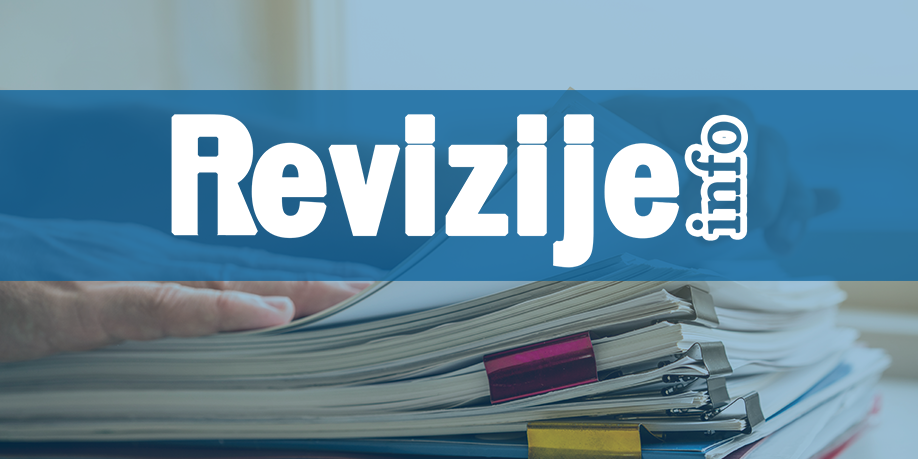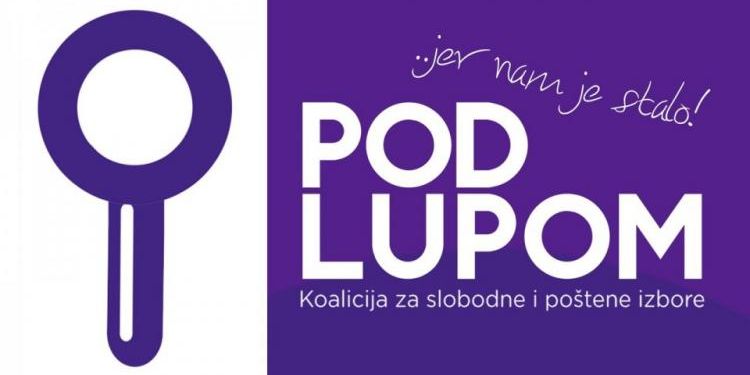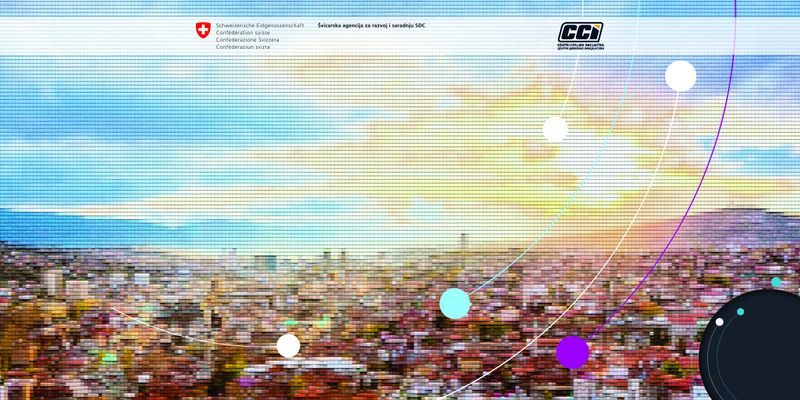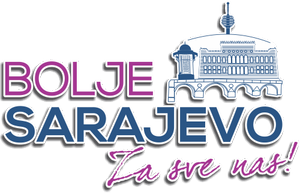A country in which 1/8 of the population is out of job, in which the new-born babies do not exist, as they do not have a personal identification number, in which the citizens are faced with a threat of impossibility of leaving the country, in which the citizens are asking the elected representatives in the street to start solving the problems, rather than generating the new ones, is the Bosnia and Herzegovina at the beginning of 21st century. This is a country that has 13 governments and parliaments. The work of these governments and parliaments is monitored by CCI and reports on it are provided to the public. What they did in the first quarter 2013, what was their performance and how much attention they paid in their work to the lives of ordinary people and to solving the most burning problems in the country – you can read all this below. These activities are implemented as part of the CAPP II project, financially supported by USAID. More...
You can find out more of the work of the authorities on the BiH level on
More findings of the monitoring of work of the authorities on the level of Federation of BiH
Results of the monitoring of work of the autorities on the Republika Srpska level
The House of Representatives of BiH Parliamentary Assembly failed the exam in democracy and openness toward the civil society organizations. In the last 7 years CCI has been conducting monitoring of work of the Parliaments and the governments in BiH informing the public about the activities and accomplished results of these institutions and their dedication to solving the key citizens' problems. One of the segments of our reports included the information about the income of members of both BH PA Houses, in the context of the results accomplished, the overall social and economic situation in our country, European standards, and the comparison with the parliaments in neighbouring countries. BH Parliamentary Assembly is the leader in (non)performance – as more laws are often voted down than approved, which is placing our country in a situation where it is still very far away from the European integrations. The Board of BH PA House of Representatives, revolted by the annual report on the work of BH Parliamentary Assembly for 2012, which was very much to their own disadvantage as it showed the real picture of the current situation, forbade the CCI's representatives’ monitoring of the work of 47th session of BH PA House of Representatives. There was a strong reaction by the publich to such an act of BH PA House of Representatives. Both the media, citizens, NGOs and the representatives of international community stood up together to defend full openness of the work of BiH Parliamentary Assembly. More...
On 17 April 2013, Board of the House of Representatives of BH Parliamentary Assembly, under a pretext that CCI did not provide certain information about its own financial management that was requested by the secretary of HoR of BH PA, and invoking the Law on Freedom of Access to Information in BiH (LFAI), decided to deny access to the representatives of Centres for Civic Initiatives (CCI) to 47th session of BH PA HoR which was held on 18 April 2013. This happened after a period of seven years during which CCI monitored the work of both houses of BH Parliamentary Assembly, and during which it had a fair cooperation with the BH Parliamentary Assembly leadership and all the delegates of the said Parliament. Such a decision by two members of Board (Dr Denis Becirevic, the first deputy of House of Representatives of BH PA did not vote for this denial), caused a fierce debate by the delegates at the beginning of the mentioned session of this House. Very soon ensued the reactions of a big number of non-governmental organizations, media, the academic community and a big number of international organizations active in BiH (the American Embassy in BiH, the Swedish Embassy in BiH, the Office of the High Representative in BiH, the Office of the EU Special Representative, OSCE Mission in BiH, and many others). They all demanded that the Board urgently revise their decision so that the representatives of CCI are allowed to attend the next sessions of BH PA House of Representatives.
After a strong pressure by BH public and international institutions, the Board of BH PA House of Representatives made a decision on 22 May 2013 to allow the representative of CCI to be present at the 48th session of BH PA House of Representatives that was held on 23 May 2013 – but in a part of the premises reserved for media representatives, rather than in the „White Hall“ in which the CCI representatives monitored the plenary sessions of this House of the Parliament during the past 7 years. This decision to forbid the CCI representatives the attendance of the sessions, and then a rather prompt approval of the Board, somewhat reduced, was a reaction to CCI's persistent criticism of the (lack) of work of the state parliament and of many years of warning about the disproportion between the results accomplished by that institution and BH Parliament members' income, considering that the results were by far the worst and the income the highest in the region.
Finally, all this is certainly a huge step back in the achieved democratic standards in our county, and an attempt to undermine the efforts made so far by the CCI and the non-governmental sector on the whole. This is not sending a good message to citizens or the international public, especially if we consider the fact that all the relevant political parties in BiH have been strongly dedicated to accelerating the approaching of our county to Euro-Atlantic integrations, in which we are currently the last in the region. The issue of further participation of CCI's representatives in plenary sessions of both Houses of BiH Parliamentary Assembly will also be discussed soon by the Joint Board of both BH PA Houses, which will issue the final decision, in line with the Instruction on the Presence of Representatives of Non-governmental Organizations and other Subjects to the Sessions of both BH PA Houses. We expect and hope that BH PA and CCI will continue the successful cooperation that has lasted for a number of years, in the interest of BH citizens.

What is the quality of life of citizens in local communities? This is the question that CCI tried to answer by conducting a survey on the quality of life in 14 local communities throughout BiH for 2012. There has been a decrease of life quality index compared to 2011, in all municipalities. Nevertheless, the results show that Široki Brijeg is the town with the best life quality of citizens and Bihać the place with the lowest life quality. The public utility services are very expensive considering the living standard of citizens, the number of unemployed is on the rise, while the administrative apparatus is still cumbersome and too expensive. The survey on the life quality of citizens is a part of the activities conducted within the project Local Administration and Citizens, Phase II, financed by the Delegation of the European Commission in BiH. More...
A survey of the Centres of Civic Initiatives on the average index of citizens' life quality was conducted in 14 BiH municipalities and cities (Banja Luka, Tuzla, Novo Sarajevo, Mostar, Doboj, Pale, Foča, Trebinje, Bihać, Travnik, Široki Brijeg, Livno, Bijeljina and Zenica). It shows there has been a fall in this index by as much as 5.5% compared to the survey conducted one year ago, and that this index is now 47,48 of maximum 80,00.
The main goal was to highlight the segments of citizens' life quality that are either entirely or partly the responsibility or within the jurisdiction of local governance, or on the improvement of which the local governance can directly influence. The goal was thus to underline the importance and the responsibility of local governance for the quality of life of its citizens.
The obtained results may be useful for both local and other authority levels to understand the current situation and trends in certain fields of life quality and to intensify the activities on their improvement, either through one-time interventions, where possible, or through planning long-term strategy developments.
At the same time, the results show the need for the citizens within the local communities to be engaged in solving the issues that considerably influence the life quality, by cooperating with and /or pressuring the authority bodies, depending on situation.
The survey has shown that the administrative apparatus in municipalities continues to be too expensive, and instead of undergoing a necessary curtailment, it has become even more cumbersome in the meantime. Trebinje and Mostar, like in the previous years, continue to be the municipalities with the worst administration staff vs. number of inhabitants ratio, with 1 administrative worker per only 170-190 inhabitants. This means that there has been a further deterioration of the situation that was observed during the period one year ago. In 2012, Bihać Municipality had the highest allocation rate from the budget for the salaries and benefits of the administration staff – over 28%. Most municipalities have held the previous level of councilors' fees. Thus, among the observed municipalities, Banja Luka has the highest councilors' fees – 850 KM, while the lowest fees are in Livno – 220 KM. At the same time, allocations for the work of local communities are minimal, and in as many as 4 of 14 observed municipalities such allocations do not even exist.
As far as the public utility services, the prices went up only after the local 2012 Elections. The citizens of Bijeljina drink the most expensive water which costs 1.39 KM/m³, and the same price is for the sewer utility services. In contrast, the citizens of Zenica pay only 0,47 KM/m³ for water.
GDP per capita in municipalities in the year 2011 (for 2012 the statistics are not available yet) ranged from about 5.600 KM in Foča to 10.960 KM in Banja Luka, and 18.820 KM in Novo Sarajevo, showing a mild increase compared to the year 2010. At the same time, a share of households with total income lower than 600 KM (one of the parameters of poverty level) is about 6% in Široki Brijeg, and as high as 40% in Bihać. The biggest number of respondents who have the difficulties in making ends meets are recorded in the area of municipalities of Trebinje, Pale and Foča, which showed exactly the same situation after the survey conducted one year ago.
In most municipalities the trend of the number of the employed in the last 4 years has been negative, without major changes of ratios between the observed municipalities. In terms of the number of inhabitants, the best situation is in the territory of the municipality of Novo Sarajevo, where there is one employee per 3 inhabitants. This municipality is followed by Banja Luka, Tuzla, Mostar, Trebinje and Široki Brijeg with about 4 inhabitants per one employed person. The worst situation in this field is in Livno and Foča municipalities, where there is one employed person per 7-8 inhabitants.
In most observed municipalities, in the past few years, there has been a slight increase in the number of medical doctors in primary health protection with regards to the number of inhabitants. The best ratio is present in Mostar, with one doctor per about 550 inhabitants, which is however not directly proportionate to the citizens' satisfaction with the level of health services. On the other hand, in Livno for example, this proportion is not good (1:1270) but has still improved compared to one year ago. The respondents from the municipalities of Zenica and Mostar had most reasons to complain, because of long waiting for the doctor's service during the day, distance from the health center and delays in getting help. The best situation is in municipalities Bijeljina, Livno, Foča and Pale.
To sum up, according to all eight indicator sets of objective life quality, the highest life quality index was shown for the municipality Široki Brijeg, i.e. 57,049, out of maximum 80,00. The lowest life quality index was shown for the municipality Bihać, i.e. 41,364. Compared to a survey conducted one year ago, the first 3 local communities (Široki Brijeg, Banjaluka and Novo Sarajevo) kept the lead positions, while generally in all municipalities there is a trend of decrease of life quality index compared to the last year.
These are just some of the results of measuring life quality by using the methodology designed according to the parameters used in EU countries, by collating the available data collected from officially available sources and responses given in a survey organized in all 14 municipalities and covering a total of 1.381 respondents.

www.budzetnarodu.ba is a website launched by CCI in an intention to bring the processes of budgetary inflow/outflow closer to ordinary citizens. How the budget is replenished, how much money it has and for which purposes and in which way BH citizens' money is spent are the subjects addressed by this website, in a simple language suited to the ordinary people. The budget planning processes in BiH at all levels of authority are mainly conducted without the citizens' knowledge. With the new project implemented by CCI under the name „Budget“ we intend to increase transparency of the budgeting process as well as to increase citizens' participation in the budget planning process at the local, cantonal, entities' and state levels in BiH. This project is financially supported by the Embassy of the Kingdom of Holland in BiH. More....
The
Project „Budget“ has a goal to contribute to better understanding of
the budget policy in BiH, in order to make the budgeting process more
simple and more understandable to the citizens and the public in
general. Also, the project aims
to propose and advocate the relevant and effective improvement measures
for public budgeting policies, increasing the budgeting process
transparency and increasing the participation in the budget making
process at all levels of government in Bosnia and Herzegovina. In the
early stage of the project, a comprehensive financial and legislative
budget analysis was conducted for all 4 levels of authority (BiH, RS,
FBiH, Sarajevo Canton), as well as for three local budgets (Tuzla, Banja
Luka and Mostar). The goal of
the legislative analysis is to present the budgeting process through the
prism of the current BiH legislation, to show the deficiencies that
exist in this field, and to provide relevant and effective proposals for
improvement of legislation and public budgeting policies.
The financial analysis represents a detailed overview of 7 selected
budgets at 4 government levels, according to COFOG analysis of public
consumption (classification of public expenses and expenditures
according to their purpose), and the consumption of extrabudgetary
funds. The analyses covered 80% of overall budgetary and extrabudgetary
funds (for public consumption) in BiH, i.e. 8.7 of total 10.9 billion
KM.
In the first week of
June, a promotion of the results of work on the analyses was presented,
and the interactive website www.budzetnarodu.ba was made available to
the public, as a single point of reference where the citizens can
download all analyses, view the interactive presentation of public
consumption in BiH, allocation of citizens' funds for financing public
consumption, legislative framework governing all this, the current
public invitations for awarding the budget resources, as well as a
number of other information and educational tools.
In
the forthcoming period CCI will launch an advocacy campaign aimed at
optimization of budget public policies and will in parallel upgrade the
website of the campaign, as the primary PR tool.
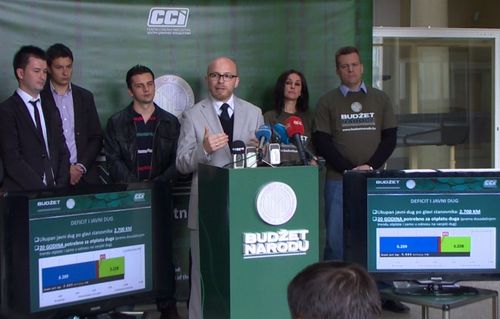
A detail from the promotion of the analyses and the website

What do the employment bureaus do and in which way they do it, i.e. how they help decrease the number of unemployed? These are some of the questions to which CCI seeks answers within the project Increasing Efficiency of Public Employment Services supported by the EU Delegation in BiH. In cooperation with the relevant ministries and representatives of the bureaus, CCI analyzes the work and proposes measures for correction of public policies aimed at contributing toward an improved work of the bureaus and better position of the unemployed. More...
Since the beginning of 2013 the CCI has been implementing the project „Increasing the Efficiency of Public Employment Services“ aimed at advocating the reforms in the employment field, and particularly at amending the current legislation defining the work of public employment services (PES). In order to increase the responsibility and efficiency of PESs, CCI will use this project to monitor the work of mentioned institutions, their policies and practices.
Since
the beginning of the campaign, cooperation has been established with
entities' employment bureaus and labour ministries; a mixed Working
Groups was also formed made of the representatives of entities' bureaus,
labour ministries, external experts and the CCI project team. The
working group has a task to analyze and propose corrections of public
policies in the employment field, especially in the field of more
efficient and effective work of public employment services and better
exercise of rights by unemployed persons. A number of Working Group
meetings and the meetings with stakeholders were held, in order to
achieve as comprehensive analysis as possible and make the best possible
recommendations. The analysis will be presented for the first time in
mid-June.
Currently, the process of designing the website www.posaonarodu.ba is about to be complete – it will be in the function of providing more information to the citizens about the importance of changes in the work of PESs, about the current policies, movements in the labour market, about the reports on monitoring the work of PESs, etc. Also, the website should be a place where the citizens (especially the young persons) will be able to get all relevant information about their unemployment-related rights, current job vacancy announcements, employment subsidies and other useful contents. The promotion of the website is expected in mid-June.
As part of this project CCI also carries out monitoring of work of PESs and evaluates their work from the point of view of efficiency and effectiveness. Amongst other, we monitor the execution of work programs, publishing the work reports and other important documents, implementation of active employment policies, mediation between the employers and the unemployed, the quality of PESs websites, etc. Periodical reports will be made on these activities that will also contain recommendations. The reports will be made available to the public, the first among them as soon as in mid-June.

„A Half of Chance to Others“ is a name of the campaign by which CCI launched an initiative for passing the new Law on Games of Chance in BH Federation. The campaign aims at passing of the law that will ensure more money for the needs of the most disadvantageous population categories. CCI submitted the draft law to BiH Federation Government, and the beginning of the procedure of passing the bill in the Parliament is expected to happen in the next period. This project was supported by Balkan Trust for Democracy. More...
The Centres for Civic Initiatives (CCI) have been working for a number of years already on improving the legal framework that governs the organization of games of chance in BiH. Our efforts have resulted in a fact that in both BH entities a number of humanitarian, social, health and other needs of the population were financed from the funds collected on the basis of taxation of games of chance.
At the end of 2012 CCI started an initiative for passing of the new Law on Games of Chance in BiH Federation, which should ensure more money for meeting the needs of the most disadvantageous population categories, in a way to treat all the games of chance organizers equally thus narrowing the area for fraud, tax evasion, non-payment of duties, by making the penalties more stringent, and at the same time by ensuring a system of responsible organization of games of chance, and a modern, European legal framework favoring both the citizens and games of chance organizers and the state, by making budget inflows. At the same time, according to the new Law on Games of Chance, a half of the proceeds made from BiH Lottery operations and from all other fees paid by other organizers for issuing the permits, will paid into a separate account and earmarked for:
1) medical treatment of children and the young people with severe diseases that can be treated only outside BiH;
2) protecting the children who are victims of abuse, pedophilia, begging;
3) meeting the needs of disabled persons;
4) fighting the narcotics and addiction;
5) protection of victims of torture and violence (domestic violence shelters);
6) promotion of development of professional and amateur sport;
7) promotion of technical culture and the associations dealing with innovations;
8) work of soup kitchens.
During the first couple of months in 2013, in cooperation with the Finance Ministry, a pre-draft Law was approved and submitted to FBiH Government for discussion. The beginning of Law debate was slowed down by the current political crisis. Regardless of that, an advocacy campaign was started by CCI in May, directed toward the FBiH Government and Parliament and aimed at submission of the Law in the parliamentary procedure. A number of public advocacy forums will be held in May and June.
Due to the fact that 50% of revenues collected from the games of chance are used as support for humanitarian, social and development issues, the campaign was marked with a slogan „A Half of Chance to Others“.
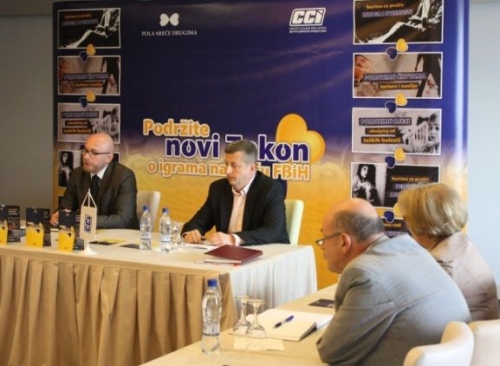
Round Table on the new FBiH Law on Games of Chance.

As part of the project “New Local Communities for the New Local Government in BiH”, the citizens gave support to the CCI’s initiative for amendment to the Law on Local Self-Governance. During the month of May information stands were organized in bigger BiH cities where we informed the citizens about the advantages provided by the adoption of the mentioned initiative. The citizens also had an opportunity to sign the petition and thus take an active part in a decision-making process. These activities were supported by the EU Delegation in BiH. More...
On information stands, in cooperation with its partners, CCI informed the citizens about the advantages offered by the adoption of the Initiative for Amendments to the Law on Local Self-Governance in both entities. This activity aimed at garnering citizens’ support for the Initiative. Together with our partners we distributed the information leaflets on stands where the advantages of the Initiative were addressed and we collected the signatures for support to the Initiative in FBiH. Given the fact that the amendments to the Law on Local Self-Governance in the RS went much further compared to FBiH, so that the draft Law, which included a major part of our Initiative (everything but the education of the LC leadership and informing the citizens), is already being debated, we decided not to collect the signatures for the support in the RS, but only to distribute the flyers. In BH Federation the Working Group completed its task and fully accepted the Initiative, so that its proposal, together with other proposed legal amendments, was submitted to the Justice Ministry of FBiH Government. Currently the opinion of the Association of the Cities and Municipalities of FBiH is awaited, so that the proposed amendments can be referred to FBiH Government. So far CCI has organized two stands, in Banja Luka and Mostar, while our partners organized the stands in the following way: in Trebinje, it was organized by OAZA, in Doboj- by AC Topeer, in Bosanski Petrovac- The Association of Farmers Jasenovca, in Livno by the Center for Citizens’ Cooperation and in Prijedor by DON. The petition for the support to the Initiative is also available for citizens online, on three portals, where they can also sign it.
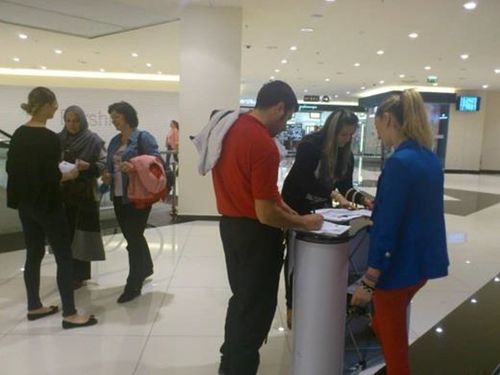
Signing the petition in Mostar.
This year, the Centres for Civic Initiatives (CCI) started the project „Fighting Corruption in the Public Health Sector“, financed by the European Union, with one of the goals including contribution to the implementation of the Strategy for Fighting Corruption in BiH in the Sector of Public Health, by passing anti-corruption measures in all ministries and health insurances funds in RS, FBiH, Herzegovina-Neretva, Tuzla and Sarajevo Cantons. In order to consider the necessary input parameters, CCI analyzed the existing anti-corruption measures in the above-mentioned institutions, and conducted a public survey on the perception of corruption in the health sector in the same fields. More....
Although formally involved in fighting corruption, most public health institutions that were subject to the survey are not informed in detail about the binding measures and the implementation schedule for the measures contained in the Action Plan for implementing the state Strategy for Fighting Corruption. None of the monitored institutions adopted or implemented their own Integrity Plan, as envisaged by the Action Plan for implementing the state Strategy for Fighting Corruption (2009-2014), more precisely measure 2: Prevention of Corruption, item 2.14, for which the deadline was May 2012.
Of observed institutions, the Republic of Srpska Health Insurance Fund and the Health Ministry of Sarajevo Canton take the lead in creation of system pre-conditions for fighting corruption, as they have adopted some of the necessary measures, while the majority of observed institutions, of all the prevention measures against corruption, approved only the code of conduct and implementation rules on internal organization or enabled electronic communication with the health right beneficiaries or enabled the tools for citizens' complaints.
On the other hand, a half of interviewed citizens believe that corruption in health sector has increased compared to the last year. According to the results of the survey, about two thirds of respondents believe that health sector, police and education are the social life segments with the highest degree of corruption. Only a small number of citizens (about 10%) believes that the level of corruption in health sector has to a higher or lesser degree decreased in the past year.
More than one third of the respondents gave a positive answer to the question whether they or some of their family members gave bribe in the health sector in any form (money or gift). As most frequent reasons for the existence of corruption, the respondents mentioned a bad custom to offer something to the doctor (37%), then insufficiency of legislation, control and sanctions (19%); they said that the services that were the most subject to corruption were the waiting lists for surgeries (27%), referral to hospital treatment (23%) and selection of prescription drugs (18%). Of 6 offered measures to be taken in the prevention and fighting corruption in the health sector, the respondents put the threats of stricter punishments to the employees on the first place and the introduction of more stringent supervision and control measures in all public health institutions.
In the forthcoming period, in partnership and cooperation with the Agency for Prevention and Coordination of Fighting Corruption and target institutions, CCI will work on passing anti-corruption measures and on monitoring their implementation, inform the public and run the public campaign aimed at ensuring that the citizens make their contribution too toward decreasing corruption in health sector.
The inter-municipal team for development and application of projects in Birac area successfully mastered the knowledge in fundraising. After a comprehensive training run by CCI, the local Team for Development made its first projects and applied for funds with the donor. The projects were approved by SDC who will finance the project for the introduction of free internet in municipalities Bratunac, Vlasenica and Milici, and a project of free school for foreign languages in Srebrenica. This is an excellent example of how transfer of knowledge and practice can give positive results even in extremely underdeveloped communities. More…
These
activities are implemented by CCI in the municipalities of Srebrenica,
Bratunac, Vlasenica and Milići, in which the component “Participation of
Citizens in Decision-Making Processes” is implemented, as part of the
project “Reconciliation and Development of Communities/Participatory
Democratic Development in 4 municipalities of Birac Region 2011 – 2013.”
The Interdisciplinary Team delivered the first project with the CCI’s
support and, with the help of partner organizations ‘Nature’ and
‘Friends of Srebrenica’, started the training for transferring the
responsibilities of the project.
As
part of the project segment, i.e. work with the inter-municipal Team
for Development and Application of Projects, after successful applying
for a joint project with the Swiss SDC and a positive answer for
participation in financing the ‘Mini Project’, introduction of free
Internet in the municipalities of Bratunac, Vlasenica and Milići and a
school for foreign languages in Srebrenica, the Team members, with CCI’s
support, started the project implementation. In June, which was the
first month of implementation, an information campaign on the project
promotion as well as administrative finalization of the project were
planned, with Srebrenica Municipality as the main implementer.
The
inter-municipal team also nominated the project ‘Children’s
Playgrounds’ to the Norwegian Embassy; the project is designed to
construct ‘mini playgrounds’ in the municipalities of Vlasenica, Milici
and Bratunac. For all four municipalities the Team also developed and
prepared an ambitious project under the name ‘Kozarstvo’, that should
contribute to improving the production of cattle in this underdeveloped
area.
In
the part of planned activities in 2013, CCI started practical training
with the selected partner organizations, namely, in Srebrenica with
’Prijatelji Srebrenice’ and in Bratunac with AW ’Nature’ aimed at
transferring responsibility of the project. More specifically, the plan
is for these two organizations to take over a part of the activities
from CCI in Bratunac and Srebrenica, relating to monitoring the
application of the citizen participation mechanism, after the expiry of
this stage of the CARITAS project on 31 December 2013 . This especially
refers to taking over of the responsibility of the decisions that were
adopted during the project implementation. These activities will be
transferred in the municipalities Vlasenica and Milici by the end of
this year, after the training, to the Working Development Groups,
previously made of the representatives of the municipalities and the
Local Communities, with which the CCIs initiated the adoption of the new
mechanisms.
The
activities on transferring the responsibility of the project
practically started in the municipalities of Srebrenica and Bratunac, by
holding joint meetings with CCI and then with the responsible persons
for implementation of the decisions in these municipalities.
CCI
were engaged to provide support during the period 1 October 2007 to 31
December 2013 to the representatives of local communities (LCs) and
responsible members of local municipal authorities, in order to ensure
adoption and implementation of the Decisions relating to citizens’
participation and transparency of work at the local level. CCI’s
partners on this project, which is financed by the Swiss Government
(Swiss Agency for Development and Cooperation, SDC) and the Government
of Lichtenstein, are CARITAS and AC Priroda.
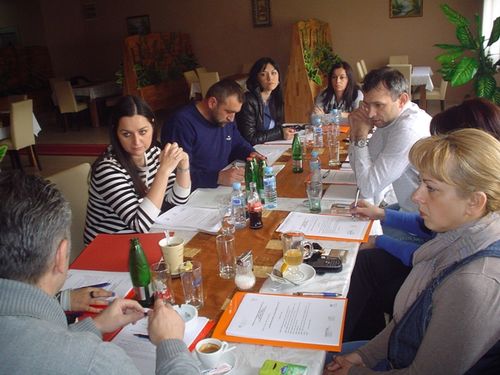
Meeting of the Team for Development and Application of Projects in Bratunac
A campaign of introduction of additional anti-corruption measures in the general hospital Sveti vracevi in Bijeljina is being implemented by CCI. The goal of the campaign is to, based on the current Rulebook on Prevention and Fighting Corruption, adopted at CCI's initiative, additionally improve transparency and efficiency of medical services. These activities are implemented as part of CAPP II (Civic Advocacy Partnership Programme) project, financially supported by USAID. More...
Centres
for Civic Initiatives (CCI) have continued to pursue the campaigns in
the fields of medicine and education that are relying on the Strategy
for Fighting Corruption 2009-2014 and the related Action Plan. In the
field of education we continued the activities on educating the children
and teachers in ethics and in anti-corruption. In the health sector, we
carried out monitoring of the amendments to the Rulebook for Prevention
and Fighting Corruption; as part of this we would single out the
campaign run in the General Hospital in Bijeljina implemented in
cooperation with our partner organization Helsinki Committee RS (HC RS).
As mentioned above, we
conducted a health sector campaign aimed at incorporation of
anti-corruption measures in the General Hospital „Sveti vračevi“
Bijeljina in cooperation with the partner organization RS HC. A working
group was formed, made of the representatives of GH „Sveti vracevi“,
the District’s Prosecutor’s Office Bijeljina, the Center of Public
Security Bijeljina and representatives of RS HC and CCI. Drawing from
the current Rulebook, the working group identified additional specific
measures for decreasing corruption, primarily through making the lists
of specialized checkups available to the public and their posting on
websites and bulletin boards. The said anti-corruption measures are in
the process of adoption. Particular NGOs (that are the most frequent
users of medical services) and the stakeholders from the area of
Bijeljina municipality were motivated and strengthened, through setting
up of an informal network which should enable their active participation
in fighting corruption in the health sector.
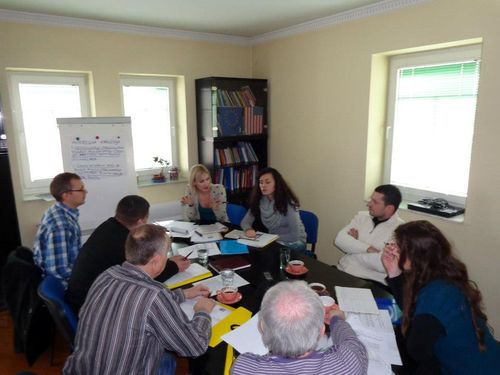
Working meeting at the general hospital in Bijeljina.




